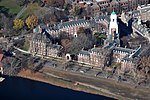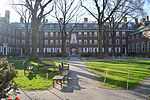Harvard Institute of Politics
1966 establishments in MassachusettsAC with 0 elementsEducational institutions established in 1966Harvard Institute of PoliticsHarvard Kennedy School ... and 5 more
Harvard UniversityMonuments and memorials to John F. Kennedy in the United StatesPublic policy researchResearch institutes in MassachusettsStudent political organizations in the United States
The Harvard Institute of Politics (IOP) is an institute of the John F. Kennedy School of Government of Harvard University that was created to serve as a living memorial to President John F. Kennedy, as well as to inspire Harvard undergraduates to consider careers in politics and public service. The IOP works to bring the academic world into contact with the world of politics and public affairs in a non-partisan way to promote public service. Undergraduates Menat Bahnasy and Kevin Ballen serve as President and Vice President of the Institute.
Excerpt from the Wikipedia article Harvard Institute of Politics (License: CC BY-SA 3.0, Authors).Harvard Institute of Politics
Massachusetts Avenue, Cambridge Cambridgeport
Geographical coordinates (GPS) Address Nearby Places Show on map
Geographical coordinates (GPS)
| Latitude | Longitude |
|---|---|
| N 42.37145 ° | E -71.1221 ° |
Address
Harvard University
Massachusetts Avenue
02139 Cambridge, Cambridgeport
Massachusetts, United States
Open on Google Maps







